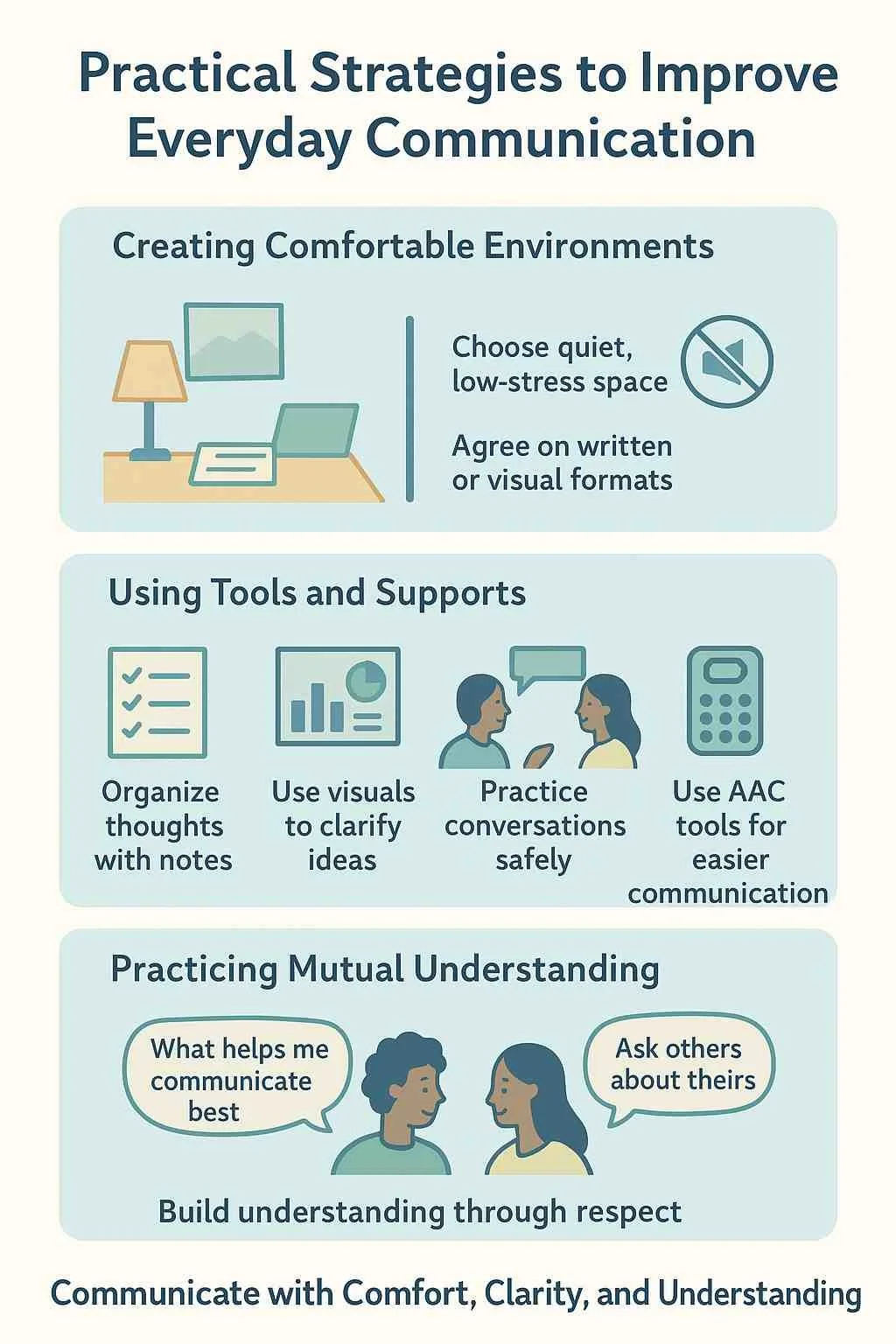Effective Communication Support for Neurodivergent Adults
Communication connects us to others and shapes how we share ideas, feelings, and experiences. For many neurodivergent adults, the way people communicate in daily life can feel unpredictable or overwhelming. Unspoken social rules, indirect language, and shifting expectations can make conversations feel exhausting or uncertain.
Communication does not need to feel that way. With the right support, it can become easier to express your thoughts, connect with others, and feel heard in the ways that matter to you. Autistic adults and other neurodivergent people can build confidence and comfort in communication, using approaches that honor their individual styles and strengths.
Key Takeaways
Communication is personal. Every person connects in their own way, and there’s value in all communication styles. Recognizing how you naturally express yourself creates a foundation for growth and connection.
Support strengthens communication. Guidance and practice can make conversations feel more comfortable and meaningful, helping you communicate with greater ease and confidence.
Direct expression builds understanding. Sharing your needs and preferences clearly encourages mutual respect and stronger relationships.
Speech therapy offers useful tools. Speech-language pathologists provide individualized strategies that match your communication goals, strengths, and personality.
Understanding Communication Support for Neurodivergent Adults
Building Self-Awareness in Communication for Neurodivergent Individuals
Practical Strategies to Improve Everyday Communication
Strengthening Social Skills and Self-Advocacy Skills
Professional Communication Support for Neurodivergent Adults
Community, Connection, and Advocacy
Frequently Asked Questions About Communication Support for Neurodivergent Adults
Understanding Communication Support for Neurodivergent Adults
Neurodivergent people communicate in many meaningful ways, and their preferences reflect genuine differences in how they connect with others.
An autistic person might prefer clear, literal language and find small talk or vague phrasing tiring. Others may interpret nonverbal cues or facial expressions differently. These differences highlight the wide range of human communication rather than any lack of ability. Every communication style offers value and insight into how a person experiences and shares the world.
The Double Empathy Problem
The double empathy problem describes how communication breakdowns can happen on both sides. Neurodivergent and neurotypical individuals may understand and express things differently, leading to missed cues or misinterpretations. This idea, supported by autism research, reminds us that communication works best when everyone is open to learning from each other.
Focusing on mutual understanding creates space for connection and respect. Communication grows stronger when both neurodivergent and neurotypical people meet each other with curiosity, patience, and a shared effort to find common ground.
Building Self-Awareness in Communication for Neurodivergent Individuals
Recognizing Your Natural Communication Style
Self-awareness is an integral part of confident communication. It helps you notice how you express yourself most comfortably, such as through written messages, short conversations, or planned topics before meetings.
Understanding your natural communication style gives you the language to share your needs with others. This kind of self-advocacy supports clearer conversations and reduces the chance of misunderstandings.
Direct Language and Straightforward Communication
Direct language means saying what you mean in a clear, honest way. Many individuals find this approach helpful because it removes the need to interpret hints or hidden meanings.
You can build this skill by using concise language and ensuring your message aligns with your intent. Over time, straightforward communication can make interactions with family members, coworkers, and friends feel more natural and supportive.
Try This Reflective Neurodivergent Quiz
Wondering if you’re neurodivergent? Try our quiz!
Practical Strategies to Improve Everyday Communication
Creating Comfortable Communication Environments
Feeling comfortable supports more authentic communication. This might mean choosing quiet spaces, limiting background noise, or agreeing on written or visual formats for conversations. Small changes can make a big difference in reducing stress and improving focus.
Using Tools and Supports
Many neurodivergent adults benefit from tools that make communication easier. These may include:
Written or digital notes to organize thoughts before meetings or conversations
Visual supports, such as charts or icons, to clarify key ideas
Scripts or role-play to practice conversations in a safe, supportive way
Speech-generating devices for people who use augmentative and alternative communication (AAC)
Practicing Mutual Understanding
Communication improves when both people work to understand each other’s styles. You can encourage mutual understanding by explaining what helps you communicate best and inviting others to share their preferences. Over time, this builds respect, reduces miscommunication, and supports mental health through more positive interactions.
Strengthening Social Skills and Self-Advocacy Skills
Understanding Body Language and Nonverbal Communication
Body language and other nonverbal communication cues can play a big role in how messages are received. Some neurodivergent individuals notice these cues differently or may prefer to rely more on words and tone. Recognizing how you interpret facial expressions, gestures, and eye contact helps you respond in ways that feel comfortable and authentic.
You can also share your preferences with others. For example, you might let coworkers know that eye contact isn't a sign of attention to you, or that you communicate best through direct language. These small acts of self-advocacy encourage understanding and reduce unnecessary social pressure.
Building Confidence in Social Interactions
Many neurodivergent people describe social situations as tiring or unpredictable, especially when unspoken expectations create confusion. Focusing on clear, direct communication helps reduce that stress. Practicing short, specific phrases or setting boundaries before social events can make interactions smoother and more predictable.
Social interactions extend beyond friendships and work conversations. Dating and romantic relationships can feel especially complex, since nonverbal communication, facial expressions, and social cues often carry hidden meanings.
For autistic adults, direct language and explicit communication can make dating more comfortable and honest. Sharing personal preferences openly, like how you show affection, what types of plans feel manageable, or how you interpret humor, helps both people feel more at ease.
Speech therapy, peer mentoring, or group sessions focused on social communication can help improve communication confidence in these settings. A speech-language pathologist can guide you through real-life scenarios, such as small talk, dating, or maintaining eye contact, while keeping your natural communication style at the center.
Growing Through Mutual Understanding
The double empathy problem reminds us that communication challenges are shared. Misunderstandings between autistic and neurotypical people often come from different communication expectations, not from a lack of ability. When both sides show curiosity and patience, mutual understanding grows.
Effective communication does not require masking or changing who you are. It begins with self-awareness, self-advocacy, and respect for diverse communication styles.
Professional Communication Support for Neurodivergent Adults
How Speech Therapy Can Help
Speech therapy offers practical tips for effectively communicating. For neurodivergent adults, speech-language pathologists focus on building skills that match individual goals, preferences, and communication styles. Sessions may include:
Practicing direct and clear language for daily interactions
Learning strategies to manage social communication challenges
Developing confidence with both nonverbal and verbal communication
Speech therapy is not about changing how a neurodivergent person communicates. It’s about expanding communication options, reducing stress, and finding approaches that feel natural.
Collaboration and Self Advocacy
Effective communication support grows stronger through collaboration. Working with a speech-language pathologist encourages self-advocacy by helping you identify and express what works best for you. Over time, this can improve relationships at work, at home, and in the community.
The goal is not to meet neurotypical expectations but to communicate in ways that feel authentic, respectful, and empowering.
Community, Connection, and Advocacy
Building Confidence Through Community
Many autistic adults and other neurodivergent individuals find strength and encouragement in community spaces. Online communities, advocacy groups, and local organizations create safe places to share communication experiences and strategies. Groups such as the Autistic Self Advocacy Network and the National Autistic Society offer information, peer connection, and resources about autistic communication differences and support options.
Being part of a community helps reduce feelings of isolation and low self-esteem that can come from past communication challenges. It also encourages self-advocacy by showing that there are many valid communication styles within the autism spectrum.
Supporting Mental Health Through Communication
Effective communication can significantly impact mental health. Feeling understood improves emotional well-being and supports stronger personal relationships with family members, friends, and coworkers. Speech therapy and self-advocacy skills can help reduce communication barriers, enhance daily life, and create space for more meaningful connections.
Communication support for neurodivergent adults is about enhancing communication confidence, not changing who you are. By recognizing your natural communication style and sharing your preferences, you help others learn to meet you halfway.
Continuing to Grow
Communication evolves through practice and reflection. You can continue to enhance communication by:
Practicing conversations in comfortable settings
Learning about nonverbal cues and facial expressions in context
Using straightforward language and direct communication to express needs
Working with a speech-language pathologist who understands communication differences
Communication growth is not about fitting into neurotypical communication styles but about creating mutual understanding between neurodivergent and neurotypical people. Everyone benefits when diverse communication styles are respected and valued.
Frequently Asked Questions About Communication Support for Neurodivergent Adults
1. What does communication support for neurodivergent adults involve?
Communication support for neurodivergent adults focuses on helping people express themselves more clearly and confidently.
This may include improving verbal communication, understanding nonverbal cues, or developing alternative communication strategies. Support can also include working with a speech-language pathologist to practice effective communication in daily situations.
2. How can speech therapy help autistic adults?
Speech therapy helps autistic adults build communication skills that match their personal goals and preferences. It might focus on direct language, social interaction, or nonverbal communication. Speech therapists provide strategies that make conversations easier and more comfortable.
3. What are common communication challenges for neurodivergent people?
Communication challenges can include interpreting facial expressions, reading nonverbal cues, maintaining eye contact, or following indirect or figurative language. Some neurodivergent people also find small talk tiring or difficult to interpret. These experiences are part of the wide range of natural communication differences, and personalized support helps each person find strategies that fit their communication style and goals.
4. Can alternative communication methods be helpful for autistic adults?
Yes, alternative communication methods can be very helpful for autistic adults. Tools such as speech-generating devices, text-based communication, and sign language can make it easier to express thoughts, feelings, and needs. The most effective method is the one that matches your comfort level, communication preferences, and daily routines.
5. How can neurotypical people improve communication with neurodivergent people?
Improving communication begins with openness and respect for different communication styles. Neurotypical people can support clearer interactions by using direct language, allowing extra time for processing information, and avoiding assumptions about body language or eye contact. Listening with curiosity and asking about communication preferences helps build mutual understanding and stronger connections.
How Connected Speech Pathology Can Help
Connected Speech Pathology provides online communication support for neurodivergent adults through individualized speech therapy. Our speech-language pathologists help identify your natural communication style and develop strategies that align with your personal goals.
We offer guidance in using direct language, building self-advocacy skills, and improving social interaction in personal and professional settings. For autistic adults and other neurodivergent individuals, our online format provides a flexible and supportive space to practice communication skills with confidence.
Summary
Neurodivergent adults can thrive with communication that feels natural, clear, and comfortable. Building self-awareness and using effective communication strategies helps reduce stress and improve confidence.
Support from trained professionals, peers, and advocacy networks can make daily interactions smoother. Every communication style has value, and with the right tools, every person can express themselves effectively and be understood.
About the Author
Allison Geller is a communication coach, speech-language pathologist, and founder of Connected Speech Pathology, an international online practice providing professional communication coaching and speech therapy for children, teens, and adults. With more than two decades of experience, she has worked in medical and educational settings, published research on aphasia, and leads a team of specialists helping clients improve skills in public speaking, vocal presence, accent clarity, articulation, language, fluency, and interpersonal communication.












